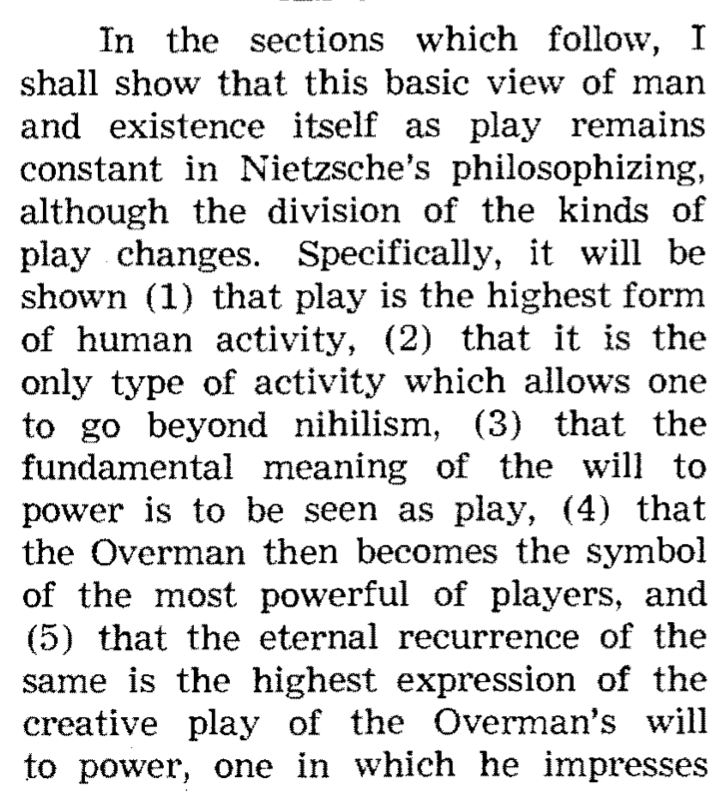Play
30 Oct 2021 02:15 - 18 Jun 2023 05:18
- Play is a concept with the capability of reorganizing everything else around it. It resists formal characterization, which is too serious. Look, I'm playing with it right now! Applying play to itself is a form of play, beloved by nerds like me who get entranced by the possibilities of self-reference.
- And play is extremely relevant to any theory of agency. The standard model of agency is essentially rational – that there are goals and actions are undertaken in pursuit of these goals. Play is by definition not goal oriented, or at least, play-goals are quite different from rationality-goals. Rationality-goals maximize this mythic substance called utility; play-goals are inherently immeasurable.
- That sounds a bit more snooty than it should. It's not that play-goals are better than reasoned goals, exactly. That would be contradictory. But they are apart in some way. More advanced? They have a spiritual shine to them, a liveliness lacking in dull plodding grandgrindian utility maximizers. Or claim to, at least. They are part of the infinite game. A certain self-containment. A rational-goal is always in pursuit of something outside of itself, and animated by something outside itself. A play-goal is more autonomous, more hypersititional, it self-creates, it is its own justification.
Etymology
- Words like illusion and deluded are derived from the latin root ludo, to play.
- ludere, ludo "to play, mimic, deceive" allude, allusion, collude, collusion, delude, delusion, elude, elusive, illusion, interlude, ludic, ludicrous, prelude, prolusion
some earlier takes on play
assorted references and other views
- Huizinga. Homo Ludens
- The Nature of Play, Thomas Henricks
- from The Journal of Play! Apparently this is a serious field.
- Winnicott, Playing & Reality
- Why are Rooie Rules Nice?
- interesting, sort of Ethnomethodology study of a children's game.
- niceness – negative attitude to "purpose stuff". (see anti-purpose)
- According to Hinduism, play is a fundamental aspect of the universe
- Brahman is full of all perfections. And to say that Brahman has some purpose in creating the world will mean that it wants to attain through the process of creation something which it has not. And that is impossible. Hence, there can be no purpose of Brahman in creating the world. The world is a mere spontaneous creation of Brahman. It is a Lila, or sport, of Brahman.
- And according to the Buddhism-inflected theory of Meaningness, play is an important part of the complete stance, one of the textures of experience that comprise it.
Play is nebulous patterns of control, where eternalism promises complete control
Enjoyment of the dance of nebulosity and pattern, which is an aspect of play, is the characteristic feeling of the complete stance
Free Play, Nachmanovitch
Blood Meridian
- Thinking about play tends to paint it as a kind of lightweight, inconsequential activity, a view which is at best only partially accurate. There is something deadly serious at the heart of play and if not, it wouldn't be such a fascinating topic.
The judge smiled. Men are born for games. Nothing else. Every child knows that play is nobler than work. He knows too that the worth or merit of a game is not inherent in the game itself but rather in the value of that which is put at hazard. Games of chance require a wager to have meaning at all. Games of sport involve the skill and strength of the opponents and the humiliation of defeat and the pride of victory are in themselves sufficient stake because they inhere in the worth of the principals and define them. But trial of chance or trial of worth all games aspire to the condition of war for here that which is wagered swallows up game, player, all.
- – Cormac McCarthy, Blood Meridian , p260
- This is game-play of course rather than free-play, to use Nachmanovitch's language and distinction.
- David Graeber on play: What’s the Point If We Can’t Have Fun?
- and my response: Graeber v. Gradgrind
- Geertz, Deep Play
- Venkat: Deep Play
It is hard to imagine a model of creative destruction that treats non-deterministic play as sacred, and deterministic process as profane. Institutions, as we have been able to conceive them so far, are deterministic beasts, not playful ones. For Martinet-Mom institutions, security is sacred and pain is profane. For Deadbeat-Dad institutions, romance is sacred and inertia is profane. When the two are divorced, romance sours into pain, security ossifies into inertia, and revolutions are stillborn. Yet, neither notion of the sacred captures play. Play turns possibility into necessity via a sense of absolute aesthetic certainty, and necessity into possibility by irreverent undermining of pious dogmas.
